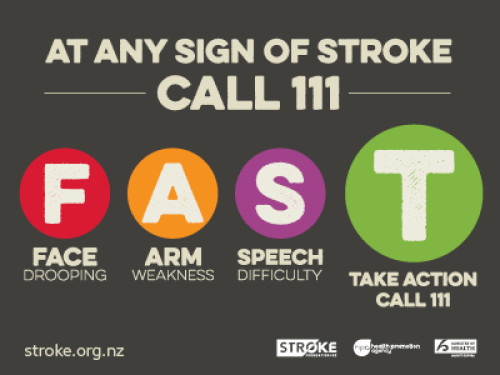

The FAST campaign graphic displays the following mnemonic:
Face: is their face drooping on one side?
Arm: is one arm weak?
Speech: is their speech jumbled, slurred or lost?
Take Action: act fast and call 111 immediately if you see any of these signs.
Stroke is the leading cause of disability in Aotearoa New Zealand. Over 9,000 people experience a stroke every year.
Prompt action can save lives and improve recovery. The F.A.S.T campaign encourages everyone to:
- learn the key signs of stroke
- think F.A.S.T and act fast
- look out for each other by calling 111 if they suspect a stroke.
Previous iterations of this campaign ran in 2016, 2017, 2018 and 2020. The campaign is a collaboration between the Ministry of Health, Health Promotion, and the Stroke Foundation of New Zealand.
Key messages
- A stroke is a brain attack when blood supply to part of the brain is cut off.
- A stroke is always a medical emergency. Call 111 immediately.
- A stroke can happen to anyone at any time. It could be someone you know or the person next to you, including someone younger than expected.
- It is important to recognise when someone is having a stroke and to start medical treatment as soon as possible because fast treatment can reduce brain damage and mean better outcomes.
- Even if you are not sure it is a stroke, it is important to call 111 immediately if you see any of the signs.
- Acting F.A.S.T can save lives, give people the best chance of recovery, and reduce ongoing costs from stroke to families, caregivers and communities.
Acting F.A.S.T
F.A.S.T is a mnemonic used internationally to help people remember some signs of stroke.
Face: is their face drooping on one side?
Arm: is one arm weak?
Speech: is their speech jumbled, slurred or lost?
Take Action: act fast and call 111 immediately if you see any of these signs.
Delayed recognition of a stroke means delayed intervention, which can have serious consequences including further damage to the brain, or death. If there are any signs of a stroke, a person should go to hospital as soon as possible so they can be assessed and treated.
Resources
More information is available on the Stroke Foundation website (external link). Campaign resources (external link) are also available.